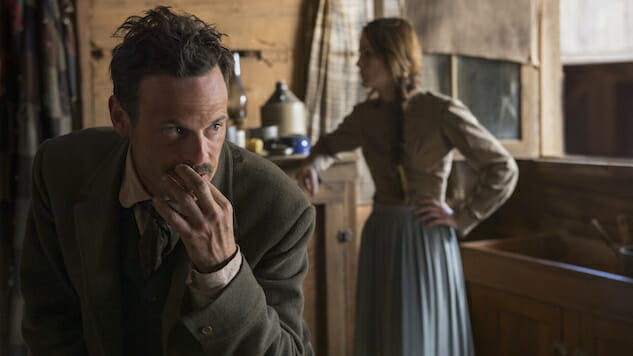Godless, Pitched as a Women’s Western, Is Really About the Dilemma of Disabled Masculinity
Photo: Ursula Coyote/Netflix
The Western is historically preoccupied with masculinity. Abandoning the easy life of the East meant that the only thing tougher than the elements was the self-image of those braving them. Manifest Destiny decreed that the Wild West be free of weakness or disability—a desert Darwinism. So when we discover that one of the protagonists of Godless, Sheriff Bill McNue (Scoot McNairy) is losing his sight, and its antagonist, Frank Griffin (Jeff Daniels), becomes right-handed by process of elimination, we’re placed in a dilemma. These disabled and impaired men don’t exist in this unforgiving world, and the lengths they go to in order to remain are the fearful struggles of displaced, emasculated men we still see today.
It may seem odd to focus on the men in a series sold on its female-driven premise—a mining town named La Belle is populated almost exclusively by women after a mining disaster wipes out its able-bodied men—but that’s exactly what the series does. In fact, as others have pointed out, Godless gives most of its screen time and dialogue to its men. It focuses on the men who remain around the town and how they relate to it. If anything, juxtaposing its leads with La Belle makes its focus on manhood even more prominent: How will these men act around a group that operates as both the ultimate temptation to bands of outlaws and the ultimate protector of its surviving lawman? The way it’s framed (which I’m not saying is right), the series is about its broken men and their lives around these women.
Scott Frank’s Netflix series had many of its genre-related themes predated by Logan, Frank’s co-written pseudo-western superhero tale released earlier this year. In it, the mutant star sees his rejuvenating powers fade and the effects of old age begin to blight. There is a black-and-white version of the film, the old-timey contrast and grime of which mimic the stoic manhood at its center. It also uses 1953’s cowboy film Shane as a name-dropped touchstone. Godless leans on much of that old-fashioned feel, filling the town of La Belle with genre mainstays like they all came on the same wagon train.
Mining, as opposed to the relatively benign professions of farming or ranching, was always the most dangerous risk—compounded by the gamble of the journey west itself. Miners chasing rushes often came away with nothing but disease and injury. But for the two at the heart of the central conflict (putting aside Jack O’Connell’s bullet-riddled but able-bodied Roy Goode), these disabilities drive them rather than end them. One uses his disability to inform his God complex with a savior’s martyrdom, while the other allows his to augment his pursuit of justice.
Both had their masculinities informed and changed by their physical decomposition—especially since it was an era when disability was increasingly associated with a loss of manly independence. The book Phallacies: Historical Intersections of Disability and Masculinity analyzes the use of prosthetics after the Civil War, finding a debate between those who wish to make their physical difference invisible and those who want to display it proudly.
This is part of what historians and disability researchers call “the dilemma of disabled masculinity.” The latter group in this struggle, often amputees like Griffin, would pin up their empty sleeve to make a sacrifice visible. That’s an honorable scar, a battle wound—and if you keep the rotting amputated arm, maybe it becomes part of your mystical outlaw legend instead of a weakness reinforcing your old age. (Daniels is around 20 years older than the life expectancy of the time period.) The U.S. National Library of Medicine posits that most disabled men during this period sought prosthetics to better help their families. The West was different. Prosthetics were as non-existent as their salesmen and families were scarce, even if you weren’t an outlaw. Griffin is making the best out of a bad situation to salvage his need for paternal dominance, which gets exercised in almost every episode as he saunters in politely, establishes himself as patriarch, then shoots his way out.
-

-

-

-

-

-

-

-

-

-

-

-

-

-

-

-

-

-

-

-

-

-

-

-

-

-

-

-

-

-

-

-

-

-

-

-

-

-

-

-








































